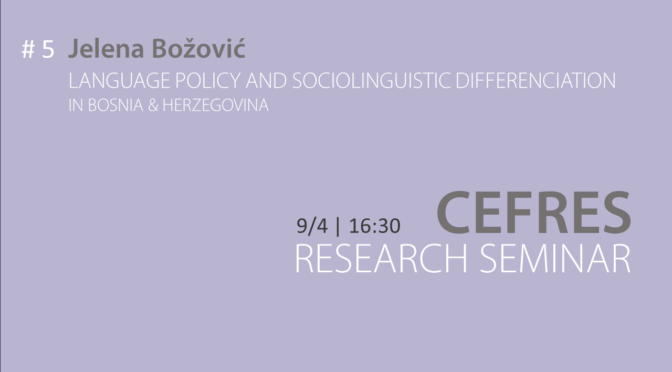Language policy and sociolinguistic differentiation in Bosnia and Herzegovina: From (in)significant difference to language boundaries
5th session of CEFRES in-house seminar
Through the presentation of works in progress, CEFRES’s Seminar aims at raising and discussing issues about methods, approaches or concepts, in a multidisciplinary spirit, allowing everyone to confront her or his own perspectives with the research presented.
Location: CEFRES Library
Date: Tuesday, April 9, 2024 at 4:30 pm
Language: English
Contact / To register: cefres[@]cefres.cz
Jelena Božović (CEFRES / FSV UK)
Speaker
- Markéta Slavková, The Prague Security Studies Institute
Abstract
The question of language boundaries is not often addressed in language policy studies. When exploring multilingual settings, language policy scholars traditionally presuppose a plurality of languages treated as separate and fixed bounded entities. Working with easily identifiable and distinguishable linguistic units then allows for a closer study of their relationships. However, this task can be challenging in settings where languages are structurally close and overlapping, and boundaries are not always sharp and clear-cut. Here, determining the relationships between the (competing) languages and linguistic groups is not necessarily straightforward. This is because some differences are more subjected to boundary processes and some less, while some go completely unnoticed. Insights from these settings can therefore expand our understanding of language boundaries as stemming not only or not always from differences in languages’ formal aspects and their denotational, usually stable, meanings, but also as something deriving from the social and political function of language and its situated use.
In my dissertation, I am focused on Bosnia and Herzegovina, a context where a transition from one common standard language to three separate national standard languages occurred following the disintegration of Yugoslavia, inevitably raising the question of differentiation and boundaries. In fact, while examining the processes of interpretation of the official language policies during my ethnographic fieldwork in this country, it became clear that they mostly consist in interpreting differences and boundaries between these languages. Thus, my research is concentrated on language boundary processes, i.e. on how language boundaries are constructed, deconstructed, blurred, transcended or ignored altogether by social actors within various language policy settings. In this seminar, I will focus on questions of which boundaries are constructed and how, and in what ways these processes are related to questions of power relations and authority as well as their implications for the official language policy.
See the complete program of 2023–2024 seminar here.

